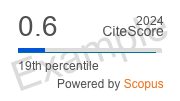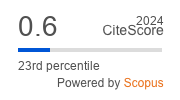Impact of atrial fibrillation on efficacy of cardiac resynchronization therapy in patients with severe heart failure
https://doi.org/10.29001/2073-8552-2015-30-1-97-100
Abstract
About the Authors
D. I. LebedevРоссия
G. M. Savenkova
Россия
S. N. Krivolapov
Россия
D. A. Balandin
Россия
References
1. Рекомендации по электрокардиостимуляции и сердечной ресинхронизирующей терапии ESC 2013 // Рос. кардиологический журнал. - 2004. - № 4(108).
2. Faran A. et al. Cardiac resynchronisation therapy in patients with endstage heart failure - long-term follow-up // Kardiologia Polska. - 2008. - Vol. 66, No. 1. - P. 19-26.
3. Никифоров В.С. и др. Ресинхронизация работы сердца -современный метод коррекции хронической сердечной недостаточности // Рос. кардиологический журнал. - 2005. - № 4. - С. 87-93.
4. Notabartolo D. et al. Usefulness of the peak velocity difference by tissue Doppler imaging technique as an effective predictor of response to cardiac resynchronization therapy // Am. J. Cardiol. - 2004. - Vol. 94, No. 6. - P. 817-820.
5. Tolosana J.M., Hernandez Madrid A., Brugada J. et al. Comparison of benefits and mortality in cardiac resynchronization therapy in patients with atrial fibrillation versus patients in sinus rhythm // Am. J. Cardiol. - 2008. - Vol. 102. - P. 444-449.
6. Gasparini M., Lunati M., Santini M. et al. INSYNC/INSYNC ICD ITALIAN Registry Investigators. Long-term survival in patients treated with cardiac resynchronization therapy: a 3-year follow-up study from the InSync/InSync ICD Italian Registry // Pacing Clin. Electrophysiol. - 2006. - Vol. 29, suppl. 2. - P. S2-S10.
7. Cleland J.G. et al. The effect of cardiac resynchronization on morbidity and mortality in heart failure // N. Engl. J. Med. -2005. - Vol. 352, No. 15. - P. 1539-1549.
8. Abraham W.T. et al. Cardiac resynchronization in chronic heart failure // N. Engl. J. Med. - 2002. - Vol. 346, No. 24. - P. 1845-1853.
9. Bristow M.R. et al. Cardiac-resynchronization therapy with or without an implantable defibrillator in advanced chronic heart failure // N. Engl. J. Med. - 2004. - Vol. 350, No. 21. - P. 21402150.
10. Burri H. et al. Improvement in cardiac sympathetic nerve activity in responders to resynchronization therapy // Europace. - 2008. - Vol. 10, No. 3. - P. 374-378.
11. Abraham W.T. et al. Cardiac resynchronization in chronic heart failure // N. Engl. J. Med. - 2002. - Vol. 346, No. 24. - P. 1845-1853.
12. Gras D. et al. Cardiac resynchronization therapy in advanced heart failurethe multicenter InSync clinical study // Eur. J. Heart Fail. - 2002. - Vol. 4, No. 3. - P. 311-320.
13. Bax J.J. et al. Echocardiographic evaluation of cardiac resynchronizalion therapy: ready for routine clinical use // J. Am. Coll. Cardiol. - 2004. - Vol. 44, No. 1. - P. 1-9.
14. Ehrlich J.R., Nattel S., Hohnloser S.H. Atrial fibrillation and congestive heart failure: specific considerations at the intersection of two common and important cardiac disease sets // J. Cardiovasc. Electrophysiol. - 2002. - Vol. 13, No. 4. -P. 399-405.
15. Pozzoli M., Cioffi G., Traversi E. et al. Predictors of primary atrial fibrillation and concomitant clinical and hemodynamic changes in patients with chronic heart failure: a prospective study in 344 patients with baseline sinus rhythm // J. Am. Coll. Cardiol. - 1998. - Vol. 32, No. 1. - P. 197-204.
16. Bax J.J., Abraham T., Barold S.S. et al. Cardiac resynchronization therapy: part 1 - issues before device implantation // J. Am. Coll. Cardiol. - 2005. - Vol. 46. - P. 2153-2167.
17. Leon A., Greenberg J., Kanuru N. et al. Cardiac resynchronization in patients with congestive heart failure and chronic atrial fibrillation // J. Am. Coll. Cardiol. - 2002. - Vol. 39. - P. 1258-1263.
18. Molhoek S.G., Bax J.J., Bleeker G.B. et al. Comparison of response to cardiac resynchronization therapy in patients with sinus rhythm versus chronic atrial fibrillation // Am. J. Cardiol. - 2004. - Vol. 94, No. 12. - P. 1506-1509.
19. Abraham W., Fisher W., Smith A. et al. MIRACLE study group. Multicenter InSync randomized clinical evaluation. Cardiac resynchronization in chronic heart failure // N. Engl. J. Med. -2002. - Vol. 346. - P. 1845-1853.
Review
For citations:
Lebedev D.I., Savenkova G.M., Krivolapov S.N., Balandin D.A. Impact of atrial fibrillation on efficacy of cardiac resynchronization therapy in patients with severe heart failure. Siberian Journal of Clinical and Experimental Medicine. 2015;30(1):97-100. (In Russ.) https://doi.org/10.29001/2073-8552-2015-30-1-97-100
JATS XML




.png)





























